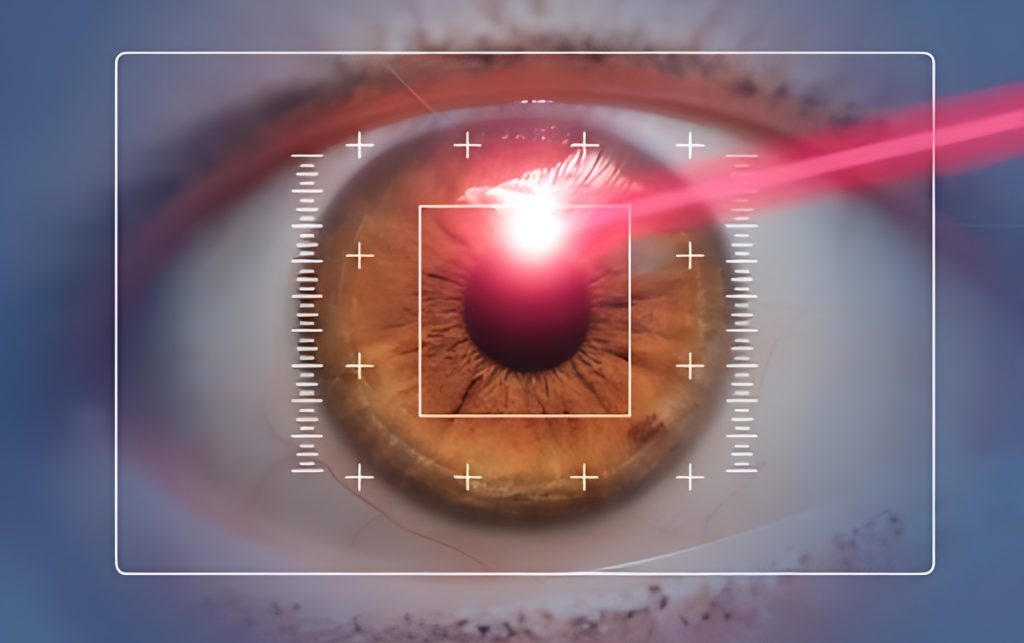Refractive lens replacement in Türkiye
Refractive lens replacement

Refractive lens replacement, also called lens replacement surgery or transparent lens extraction, may be a better option than LASIK, corneal refractive surgery or IOLs for people with presbyopia.
in refractive lens replacement surgery (lens replacement surgery). The clear natural lens of the eye is replaced with an artificial lens to correct the refractive error and achieve sharper focus, reducing the patient’s need for reading or bifocal glasses.
While lens replacement surgery is not technically approved by the US Food and Drug Administration. Some ophthalmic surgeons legally perform the operation outside this scope and in certain circumstances where this method is sometimes the most effective way to correct certain visual problems.
Refractive lens replacement is usually for people with severe presbyopia (farsightedness). Those who are not suitable for LASIK operations, corneal refractive surgery, or corrective intraocular lens implantation in general.
If you have moderate to severe presbyopia. Refractive lens replacement may be the only viable option to obtain clear vision and not depend on glasses after refractive surgery.
Lens replacement surgery can also correct nearsightedness (myopia). However, they are generally not recommended when LASIK, corneal refractive surgery, or corrective intraocular lens implantation is possible.
The procedure for refractive lens replacement surgery is almost identical to cataract surgery. The difference is that in the process of refractive lens replacement surgery. The lens being replaced is clear, not a cloudy lens due to cataracts .
Types of intraocular lenses
Similar to cataract surgery, three types of intraocular lenses are available to replace the natural lens, depending on the vision needs and health of the eyes. delusion:
- Monofocal IOLs . Monofocal lenses provide clear vision at a distance, medium or close, but not for all distances at once! Toric lenses that are used to correct astigmatism inside the eye are classified as monofocal lenses.
- Multifocal IOLs . The multifocal lens provides clear vision at multiple distances
- Compatible inner lenses. It is a type of monofocal lens that allows focusing at multiple distances by changing its position in the eye.
There is no “one size fits all” when it comes to IOLs. Eye surgeons recommend the use of an IOL that is tailored to each patient’s needs.
How to perform a refractive lens replacement
Lens replacement surgery usually takes about 15 minutes and is performed on an outpatient basis. Each eye is treated individually, and the time between eyes is usually about a week.
Anesthesia drops are used during refractive lens replacement. So there is usually no discomfort, and most people report an immediate improvement in vision after surgery.
Initial recovery from refractive lens replacement usually takes about a week when the patient can resume normal daily activities.
The final results of refractive lens replacement can take up to several weeks. You may notice vision disturbances such as blurry vision, halos and glare, or a “scratch” sensation while the eyes are healing.
The patient should be able to return to work and resume driving within a week of surgery after consultation with the eye surgeon.
The patient does not feel the lens inside the eye similar to the feeling of a dental filling when treating his teeth! It is also not visible to others because the lens is implanted inside the eye and not on the surface like contact lenses.
An artificial IOL is a permanent replacement for the natural lens and is designed to last a lifetime. There is still minimal risk (loss of the corrective effect of the lens or deterioration of vision) over time.
Lens replacement surgery to treat presbyopia (myopia).
Presbyopia affects almost everyone and becomes noticeable sometime after the age of 40 in most cases. Presbyopia is a naturally occurring age-related condition in which the eye’s natural lens becomes stiffer and inelastic, and it loses the ability to focus on close objects.
Presbyopia affects almost everyone and becomes noticeable sometime after the age of 40 in most cases. Presbyopia is a naturally occurring age-related condition in which the eye’s natural lens becomes stiffer and inelastic, and it loses the ability to focus on close objects.
Non-surgical options for presbyopia include reading glasses, bifocal or progressive lenses, and multifocal contact lenses. The other option is to wear contact lenses for monovision.
Refractive surgery cannot directly treat presbyopia, whether it is LASIK, corneal refractive surgery, or corrective lens implantation.
For people with presbyopia (farsightedness) and moderate to severe myopia as well, refractive lens replacement is often their best option.
The difference between lens replacement surgery and LASIK
LASIK remains the most common option for correcting farsightedness and farsightedness. However, when there is a very severe refractive error or an abnormal cornea, lens-based refractive surgery such as transparent lens extraction or intraocular lens implantation may be a better alternative.
Unlike LASIK or corneal refractive surgery, refractive lens replacement can correct almost any degree of hyperopia, and visual acuity after refractive lens replacement surgery is often better than the results of LASIK and corneal refractive surgery in cases of mild hyperopia and Advanced.
If you have nearsightedness (myopia) refractive lens replacement is usually only performed if you are not a suitable candidate for any other vision correction surgery.
People with nearsightedness (myopia) have a higher risk of retinal detachment during refractive surgery when the clear lens is removed, so other refractive surgery options should be explored first.
Risks and side effects of lens replacement surgery
Refractive lens replacement is basically performed in the same way as cataract surgery, so the complications of refractive lens replacement are similar to those of cataract surgery.
Lens replacement surgery is more invasive than refractive surgery such as LASIK and corneal refractive surgery where there are slightly higher risks.
However, sight-threatening complications are rare, and most complications can be successfully treated with medication or additional surgery
While refractive lens replacement has been shown to be safe and effective, all surgeries carry some degree of risk, which should be discussed in detail with your eye surgeon. Risks and complications of refractive lens replacement include:
- Retinal detachment, especially in people with severe myopia.
- Intraocular lens dislocation
- Increased eye pressure ( ocular hypertension )
- Inflammation or bleeding inside the eye
- eyelid drooping
- See glare and hazy halos from the multifocal IOL.
Refractive lens replacement is a more invasive surgery with an increased risk of complications compared to other vision correction procedures.
But the higher risk may be an acceptable trade-off if there is a severe refractive error and a strong desire to ditch glasses, contact lenses, and reading glasses as much as possible.
How can I book a refractive lens replacement in Türkiye?

- Free medical support on the phone: You will have a dedicated representative for your health condition who is always ready to answer your questions.
- Free consultation with a specialist doctor: Your medical representative will consult with a number of doctors and hospitals to find the best possible treatments.
- Free travel visa arrangement: We will contact the embassy in your country to assist you in obtaining a visa to visit Türkiye.
- Free itinerary planning: We will create a schedule for your medical trip to Türkiye.
- Free translation of documents and reports: We will translate medical documents and reports into Turkish on your behalf.
- Free support and monitoring: We will monitor the stages of treatment and be by your side every step of the way.
- Free instant translation: We will be with you during the treatment stages to provide translation between you and the medical team.
- Free accommodation and transportation coordination: We will book accommodation for you and your companions in Türkiye, along with transportation services.
Contact REHABTÜRK doctors for more information about the procedure and to evaluate your medical condition.

